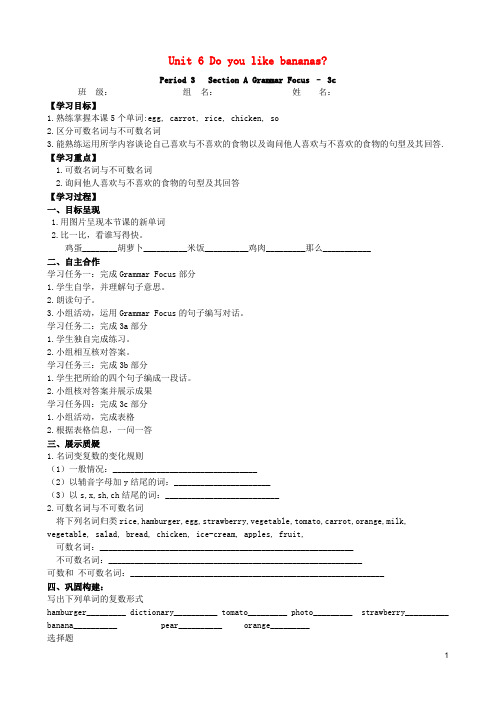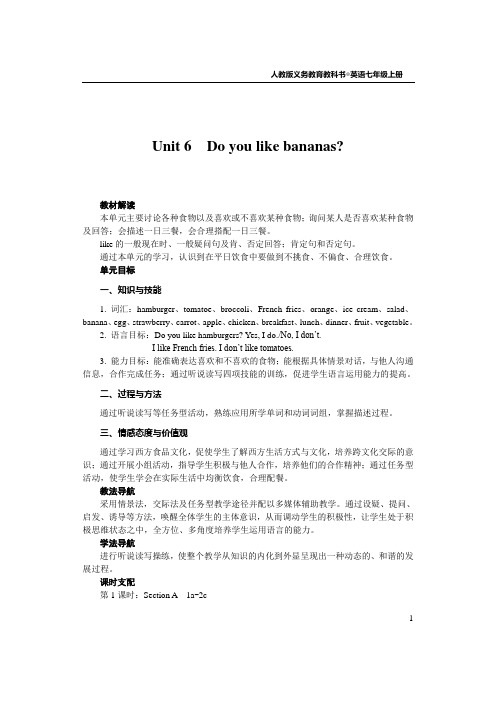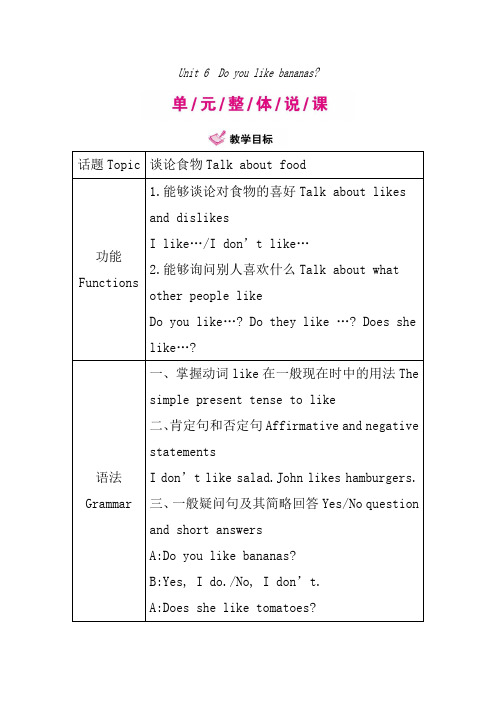第三套:新人教版七年级英语上册《Unit 6-1》导学案
人教版七年级英语上册 Unit 6 教学设计

人教版七年级英语上册Unit 6 教学设计(1)《修改后》《英语》一、课题:Do you like bananas ?二、教学目标(知识目标、能力目标、德育目标)知识目标:1)单词:do, don’t, does, doesn’t, strawberries, like, have, hamburgers, orange, tomatoes, ice cream, broccoli, salad, French fries, bananas.1. 全体学生都能正确认读这些单词、词组2. 优等生能正确书写strawberries, like, have, hamburgers, orange, tomatoes, ice cream, broccoli, salad, French fries, bananas2)句型:Do you like bananas?Yes, I do. / No, I don’t.1. 后进生能读出句子2. 大部分学生能正确理解并根据图画应用3. 优等生能假设情景熟练对话能力目标:通过学习本课,大部分学生能够用英语互相讨论喜欢与不喜欢的食品。
部分学生能进行情景对话表演德育目标:讨论美食,能喜欢应用本课目标语讨论喜欢与不喜欢的食品。
设计思路:1. 教学目标要体现学生为主体,要充分解读学生的基础上从学生的角度设计。
一是分析学生、二是换位思考。
2. 教学目标要体现具体任务,以学生能做某事为任务。
3. 教学目标要体现发展,要让学生有收获有发展。
4. 要面向全体学生,因材施教三、教学设计的思路及教学建议第六单元的主题是“询问对方喜欢与不喜欢的食物”,这些食物都是学生比较熟悉的生活食品。
在教学时老师能够使用实物进行教学,增强学生的学习兴趣和学习效果。
在传授新知识时,为了为学生创设真实的,贴近生活的情境,可以设计一些游戏,即根据不同人对食物的不同喜好,自配营养餐和填写购物清单等,这样不但激发了学生学习的热情,也达到了练习重点句型的目的。
七年级英语上册 Unit 6 Do you like bananas Period 3导学案(无答案)(新版)人教新目标版

Unit 6 Do you like bananas?Period 3 Section A Grammar Focus – 3c班级:组名:姓名:【学习目标】1.熟练掌握本课5个单词:egg, carrot, rice, chicken, so2.区分可数名词与不可数名词3.能熟练运用所学内容谈论自己喜欢与不喜欢的食物以及询问他人喜欢与不喜欢的食物的句型及其回答.【学习重点】1.可数名词与不可数名词2.询问他人喜欢与不喜欢的食物的句型及其回答【学习过程】一、目标呈现1.用图片呈现本节课的新单词2.比一比,看谁写得快。
鸡蛋________胡萝卜__________米饭__________鸡肉_________那么___________二、自主合作学习任务一:完成Grammar Focus部分1.学生自学,并理解句子意思。
2.朗读句子。
3.小组活动,运用Grammar Focus的句子编写对话。
学习任务二:完成3a部分1.学生独自完成练习。
2.小组相互核对答案。
学习任务三:完成3b部分1.学生把所给的四个句子编成一段话。
2.小组核对答案并展示成果学习任务四:完成3c部分1.小组活动,完成表格2.根据表格信息,一问一答三、展示质疑1.名词变复数的变化规则(1)一般情况:_________________________________(2)以辅音字母加y结尾的词:______________________(3)以s,x,sh,ch结尾的词:__________________________2.可数名词与不可数名词将下列名词归类rice,hamburger,egg,strawberry,vegetable,tomato,carrot,orange,milk,vegetable, salad, bread, chicken, ice-cream, apples, fruit,可数名词:__________________________________________________________不可数名词:__________________________________________________________可数和不可数名词:__________________________________________________________四、巩固构建:写出下列单词的复数形式hamburger_________ dictionary__________ tomato_________ photo_________ strawberry__________ banana__________ pear__________ orange_________选择题()1. Most boys ___________ hamburgers .A. likesB. likeC. doesD. do()2. Do ___________like French fries?A. heB. sheC. themD. you()3. My mother ____________oranges and strawberry .A. don't likeB.do likesC. doesn't likeD. doesn't likes()4. Do they like broccoli ?A. Yes , I doB. Yes , they doC. No , I don't D No , they do()5. There is some _________in the bag .A. appleB. saladC. tomatoD. banana按要求进行句型转换,每空一词。
人教版新目标 七年级英语初一上册Unit6单元教案设计含教学反思

人教版义务教育教科书◎英语七年级上册Unit 6 Do you like bananas?教材解读本单元主要讨论各种食物以及喜欢或不喜欢某种食物;询问某人是否喜欢某种食物及回答;会描述一日三餐,会合理搭配一日三餐。
like的一般现在时、一般疑问句及肯、否定回答;肯定句和否定句。
通过本单元的学习,认识到在平日饮食中要做到不挑食、不偏食、合理饮食。
单元目标一、知识与技能1. 词汇:hamburger、tomatoe、broccoli、French fries、orange、ice cream、salad、banana、egg、strawberry、carrot、apple、chicken、breakfast、lunch、dinner、fruit、vegetable。
2.语言目标:Do you like hamburgers? Yes, I do./No, I don’t.I like French fries. I don’t like tomatoes.3. 能力目标:能准确表达喜欢和不喜欢的食物;能根据具体情景对话,与他人沟通信息,合作完成任务;通过听说读写四项技能的训练,促进学生语言运用能力的提高。
二、过程与方法通过听说读写等任务型活动,熟练应用所学单词和动词词组,掌握描述过程。
三、情感态度与价值观通过学习西方食品文化,促使学生了解西方生活方式与文化,培养跨文化交际的意识;通过开展小组活动,指导学生积极与他人合作,培养他们的合作精神;通过任务型活动,使学生学会在实际生活中均衡饮食,合理配餐。
教法导航采用情景法,交际法及任务型教学途径并配以多媒体辅助教学。
通过设疑、提问、启发、诱导等方法,唤醒全体学生的主体意识,从而调动学生的积极性,让学生处于积极思维状态之中,全方位、多角度培养学生运用语言的能力。
学法导航进行听说读写操练,使整个教学从知识的内化到外显呈现出一种动态的、和谐的发展过程。
课时支配第1课时:Section A 1a-2c1第2课时:Section A 3a-3c第3课时:Section B 1a-2c第4课时:Section B 3a-Self Check课时教案第1课时Section A1a-2c教学目标一、知识与技能1. 掌握基本词汇:food、banana、hamburger、tomato、broccoli、French fries、strawberry、orange、ice cream、salad。
人教版七年级英语上册第六单元教案

Unit 6 Do you like bananas?话题Topic 谈论食物Talk about food功能Functions 1.能够谈论对食物的喜好Talk about likes and dislikesI like…/I don’t like…2.能够询问别人喜欢什么Talk about what other people likeDo you like…? Do they like …? Does she like…?语法Grammar 一、掌握动词like在一般现在时中的用法The simple present tense to like二、肯定句和否定句Affirmative and negative statementsI don’t like salad.John likes hamburgers.三、一般疑问句及其简略回答Yes/No question and short answersA:Do you like bananas?B:Yes, I do./No, I don’t.A:Does she like tomatoes?与方法在日常生活中运用英语的能力。
2.通过图片提供物体的名称,运用实际例子,感知、学习Do you like…? Yes, I do./No, I don’t. Does he like …? Yes, he does./No, he doesn’t.I don’t like…围绕上面的句型展开操练。
通过调查了解学生们喜欢什么、不喜欢什么,然后在此基础上评价自己和他人的生活是否健康。
情感态度与价值观1.通过任务型活动,使学生们在实际生活中均衡饮食,合理配餐。
2.通过开展小组活动,指导学生积极与他人合作,培养他们的合作精神。
Sectio n A 概述1.本单元主要围绕“谈论对食物的喜好”这一交际功能展开,并以like为例,进一步学习实义动词在一般现在时中的用法,是上一个单元内容的2.活动2让学生使用所学语言谈论自己对不同食物、运动类型以及颜色的喜好。
七年级英语上册Unit 6 教学设计3人教新目标版

精品基础教育教学资料,请参考使用,祝你取得好成绩!Unit 6 Do you like bananas?Third Period (Section B, 1a –1e & Self Check)Teaching aims and language points:1. Learn these words and be able to say, read and write them: ● eat, breakfast, lunch2. Be able to talk about what to eat for a meal by using: ● Tom likes/eats carrots for lunch. ● Sally likes/eats eggs for breakfast.3. Consolidate the new words in this unit.4. Consolidate the structures like: ● Does Tom like carrots?● Yes, he does./No, he doesn ’t.Teaching steps: 1.Warm-up and revision (课堂热身和复习) (1)Daily greeting to the students (日常问候) (2)Revision (复习):Check the homework.Ask some of the Ss to read out their reports. Get the other Ss to listen carefully and correct any mistakes in the reports. 2. Presentation (呈现新知识) (1)Work on Section B, 1a.Ss work on 1a by themselves first. Then, check their answers in pairs like this:A: These are eggs. It’s number 3.B: Yes, you’re right. (No, I don’t think so. It ’s number …) This is an apple. It’s number 4. Finally, check the answers together. (2)Work on Section B, 1b.Set a time limit of two minutes. Ask the Ss to discuss the lists in pairs and write their answers on their books ,and ask two Ss to write their answers on the board.(3) Work on Section B, 1cListen and circle the food in 1a. Then check the answers together. (4) Work on Section B, 1d.Listen again and fill in the chart. Ss check their answers in pairs like this:2. 学生通过完成Section B - 1a & 1b 复习前面已学的蔬菜和水果名称的单词后面的听力练习做好准备。
七年级英语人教版上册导学案:Unit 6 第四课时

第四课时Section B(2a~3b)& Self Check知识目标类别课时要点重点单词star (n.)明星;星星eat (v.)吃healthy (adj.)健康的really (adv.)真正地question (n.)问题want (v.)需要;想要be (v.)变成fat (adj.)肥的;肥胖的重点词组sports star体育明星ask sb.about sth.问某人关于某事eating habits饮食习惯for breakfast对于早餐after dinner晚饭后want to do sth.想要做某事healthy food健康食品at least最少,至少重点句式Sports star eats well!体育明星吃得很好! David asks the volleyball star, Cindy Smith, about her eating habits.大卫问排球明星辛迪·史密斯有关她的饮食习惯。
What do you like for breakfast?早餐你喜欢吃什么?I don’t want to be fat.我可不想变胖。
—Do you like eggs for breakfast?早餐你喜欢吃鸡蛋吗?—No, I don’t. I like oranges.不,我不喜欢。
我喜欢橘子。
课堂环节§自主学习方案学生自学新单词(教材P35-36的单词),看谁记得又快又准。
(2 分钟)1.star 明星;星星2.eat 吃3.well 好;令人满意地4.habit 习惯5.healthy 健康的6.really 真正地7.question 问题8.want 需要;想要9.be 变成10.fat 肥的;肥胖的【新词自查】根据句意和提示完成句子。
1.Li Na is a sports star(明星).2.Tom plays basketball very well(good).3.The sports star, Liu Xiang, eats(吃) well.4.Can you tell me about your eating habits(习惯)?5.Mary really(real) likes bananas very much.6.My grandparents are very healthy(health).7.Can you answer my question(s)(问题)?8.She wants(想要) some hamburgers.9.Jane’s mother is too fat(肥胖的).10.Jim wants to be(be) a teacher.§课堂导学方案Step 1情景导入Teacher: An apple a day keeps the doctor away. As we all know, eating healthy food will help us keep healthy. So what is healthy food and what is unhealthy food? What do you have for breakfast, lunch and dinner? Now, let’s get to know what Sandra Clark eats for three meals.(2分钟) 环节说明:以谚语“An apple a day keeps the doctor away.”作为开场白,教育学生养成健康的饮食习惯,并自然地引入新课内容。
七年级英语上册 Unit 6 Do you like bananas第3课时导学案新版人教新目标版
Do you like bananas用一般现在时来表述一日三餐喜欢吃什么,和不喜欢吃什么。
课前自学课中交流课堂教学设计【课前自习】一、写出下列单词Fruit: _____________________________Vegetables :_______________ ______________________Food: ______________________________________________二、写出下列动词的第三人称单数形式。
1.eat________2.help______3.guess________4.teach_________5.do________6.finish__________ 7wacth________ 8study________ 9.have______通过练习我知道了动词的第三人称单数的规则:(要熟记规则)1.一般情况的动词+__________2.以字母____________结尾的动词+___________3.以__________+y结尾的动词,变______为_______,再加______.4._______ 改为__________当堂训练一、句型转换。
1.Tom likes salad and broccoli. (改否定句)Tom _______ ______ salad ______ bro ccoli.2.. My brother has hamburgers for breakfast. (改成一般疑问句)______ ______ _______ ______ hamburgers for breakfast?3.. The girls like fruit and ice cream. (对划线部分提问)板书设计1 2 3 4 5 6______ ______ the girls _______?4.I don’t like ice-cream.(用she代替I)_____________________________________5.Your keys are in your bag.(改为否定句)___________________________________________二、根据文章大意按首字母填空。
初一英语第六单元教案
初一英语第六单元教案【篇一:七年级英语第六单元课堂教学实录】英语教学实录赵本中学王庆学七年级英语第六单元课堂教学实录一、教学目标1.知识目标:1)能将所学单词进行归类。
2)熟练地掌握主语为第三人称单数和非第三人称的否定句、一般疑问句及其回答。
如:do you /they like salad?yes, i /they do.no, i /they don’tdoes he like french fries? yes, he does. no, he doesn’t.i (they) like oranges. i (they) don’t like bananas.she likes bananas. she doesn’t like ice cream.2.能力目标:能用英语熟练地交流喜欢与不喜欢的食品,并在班上提问同学展开调查。
3.情感目标:通过谈论美食,进一步引导学生享受美味生活,同时培养学生的合作学习精神。
二、教学重点:掌握主语为三单和非三单时的陈述句、否定句、一般疑问句及其回答的形式。
三、教学难点:主语是第三人称单数时的否定句和疑问句中的动词变化形式。
四、教学设计:step 1. 复习前课所学单词与句型:通过看图片说单词的方式复习单词,并通过询问学生“do you like bananas/ oranges??”的形式,复习前一课的句型。
t: yesterday, we learned many words about food, right? do you still remember? now please look at the screen.t: what’s this?ss: apple.t: do you like apples?ss: yes, i do.t: and what’s this?ss: banana.t: yes, what about this one?ss: broccoli.t: do you like broccoli?ss: no, i don’t.t: yes, good job! you have good memory!step 2. 导入新课:分别请一男孩和女孩回答老师的问题,说出他们喜欢与不喜欢的食物,然后就这两位学生的情况向全班提问,以此介绍主语为三单和非三单时的各种句型。
人教新目标七年级英语上册 Unit 6 Do you like bananasSection B (1a-1f)第三课时听说课导学案
Unit 6 Do you like bananas?Section B第三课时(1a--1f)导学案一、学习目标:1、知识目标: 新单词:breakfast lunch复习所学单词:orange eggs ice-cream banana rice salad apple hamburger chicken carrot句型: ---- Do you/they like.....?----Yes, I/they do. ----No,I/they don’t----Does he/she/Zhang Ming like...?---Yes,she/he does.----No,he/she doesn’t.2、能力目标:能熟练地用英语表达自己对事物的喜好二、学习过程:Task1、自主复习:(1)写出名词的复数形式Orange _________ banana_________ boy______Key________ tomato _______ photo_______ pear_____strawberry_____(2)自读,将单词编号写在对应实物旁边,并将单词齐读。
(3)两人一组完成1b ,并展示交流。
Task2: listening(1) Listen to the tape and finish 1a.(2) Listen again and do 1d(3) Listen for the third time, write (T) for true, (F) for false●Tom likes carrots. ( )●Sally likes vegetables. ( )●Tom and Sally both like apples. ( )●Sally doesn’t like fruit. ( )●Sally doesn’t like salad. ( )Tom likes salad. ( )Task3: Talking(1)Read the tape scripts and according the conversation to finish the passage.Tom likes _____ and ______. He likes all ________. B ut he doesn’t like ________. Sally likes ________and she likes all ___________, such as bananas, oranges and _______. But do you know What she really likes? Yes, ____________!(2)Ask the students to read the passage and try to retell it(3)两人一组完成1e当堂检测一.基础达标(写出下列动词的单三形式)Have_________are __________ run ______guess______ try____ study _______catch______ stay______ destroy_______ wash______ match_______ take ______二.能力提升(用动词的适当形式填空)1、He (be)______ a boy .2、He (have)_____ got a book.3、He (like)______ to (go)_____to school.4、My mother (do not)_____like red.5、A boy with two cats (go)_____ home.6、Two boys and a girl (be)______ here.Homework:(1)Recite the conversation in 1d(2)preview the new words in the next part.。
英语上册七年级Unit 6 Do you like bananas第3课时导学案新版人教新目标版
1.咱们在学校吃中饭吧!
Let’s __________ _________ _______ __________.
2.汤姆喜欢胡萝卜吗?
________ Tom ________ carrots?
3.我喜欢所有蔬菜。
I _______ ________ _____________.
4.我只喜欢苹果。
Unit 6 Do you like bananas(第3课时)
课题
节次
3.Section B(1a-2c)
教学目标
知识与能力目标:1.掌握有关三餐及食物的单词;
2.掌握have的用法;
3、加强听力训练;
过程与方法目标:通过句型学会询问对方喜欢和不喜欢的食物。
情感态度价值观目标:学会关心他人的喜好。
I ________ ___________ ___________.
5.我喜欢西红柿和胡萝卜,但是他不喜欢。
I like ___________ and _____________, but he _________.
作业
1.默写单词。
2.完成基础训练第三课时,同步训练6-3
教学反思:
任务4结对练习总结桑德拉和汤姆早餐、午餐和晚餐的喜好
1.教师问答方式帮助学生复习单词。
2.教授新句型。
3.检查
学生
学习。
评议
拓展
1.dinner(正餐,晚餐), supper(晚餐)
2.吃三餐都可以用have如:
have breakfast, have lunch , have dinner, supper
3.at breakfast早餐时,正吃早饭
反馈
一.根据首字母填空
- 1、下载文档前请自行甄别文档内容的完整性,平台不提供额外的编辑、内容补充、找答案等附加服务。
- 2、"仅部分预览"的文档,不可在线预览部分如存在完整性等问题,可反馈申请退款(可完整预览的文档不适用该条件!)。
- 3、如文档侵犯您的权益,请联系客服反馈,我们会尽快为您处理(人工客服工作时间:9:00-18:30)。
课 题 课 型 预习展示
学习
目 标
1.记住并会运用P31关于食物的单词
2.记住并会运用Do you like…? Does he like …?的问答。
学习过程
自主认真完成任务一至任务四,然后进行对学群学。
任务一:
默写下列单词并能说出一些单词的用法
1.香蕉 2.汉堡 3.西红柿_____________(复数形式)__________
4.冰激凌__________5.沙拉__________6. 草莓___________(复数形式)__________
7.梨______________8.牛奶____________9.面包_____________
任务二:知识梳理(名词的认识)
名词分为:可数名词和不可数名词,可数名词有单数和复数之分,如:a pen some pens
不可数名词没有单复数形式, 如:some milk 一些牛奶记住不可数名词还有:milk bread
ice-cream orange桔汁
1. Do you like bananas ? Yes ,I do . I like them . 2.Do you like salad ? No, I don’t like it .
仔细观察这两个句子中划线的名词,banana为______名词, salad为______数名词
学以致用:1.Do you like __________(pear ) ? No, I don’t like _______.(填代词)
2.Do you like ___________( bread ) ? No, I don’t like _______.(填代词)
3.These are ___________(tomato ).
4.I don’t like __________(salad ).
任务三:
朗读下列对话并编写新对话, 对子组互相练习。
1. A:Do you like salad ? A:______________________________
B:Yes, I do. B:________________________________
A: Do you like bananas ? A:________________________________
B: No, I don’t. B:_________________________________
2.
A:Does he like salad ? A:______________________________
B:Yes, he does. B:________________________________
A: Does she like bananas ? A:________________________________
B: No, she doesn’t. B:_________________________________
任务四:句型转换
1. Lucy likes bananas. (变一般疑问句)
______ Lucy______ bananas ?
2. She doesn’t like pears .(改为肯定句)
She _________ pears .
3. Does Nick like bananas ?(做出否定回答)
______, _______ ________ .
4. They like oranges .(改为否定句 ) They _______ ________ oranges .
5. I like milk . (变一般疑问句)_____ _____ ________milk ?
达标测评
一.用所给词的适当形式填空
1._______Lucy________(like ) bananas ?
No, she ________(like ) pears .
2.My brother likes __________(strawberry ).
3.Do you like _________(salad ) ?
4.Do you like _________(tomato ) ?
5. I _____ _______ (not like ) apples .
二.单项选择
( )1.I like _______and________.
A tomatoes bread B tomatos bread C tomatoes breads D tomato breads
( ) 2.________ --- Yes, he does .
A Do he like bananas ? B Do you like bananas ? C Does he like bananas D I like pears .
( ) 3._____ you like salad ? No, I don’t .
A Are B Does C Is D Do
( ) 4. He _____ pears . Does he _______apples ?
A likes likes B like like C likes like D like likes
( )5.Do you like ______ ?
A pear B strawberrys C tomatos D milk
三.句型转换
1.I like bananas .(改为一般疑问句)
________ _______ ________ bananas ?
2.Does Bob like salad ?(作出否定回答 )
________ , ________ __________.
课后反思
通过本节课的学习,我最大的收获是________________________
感到自己有待加强的是___________________________________________。
